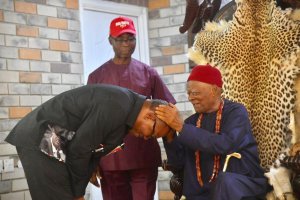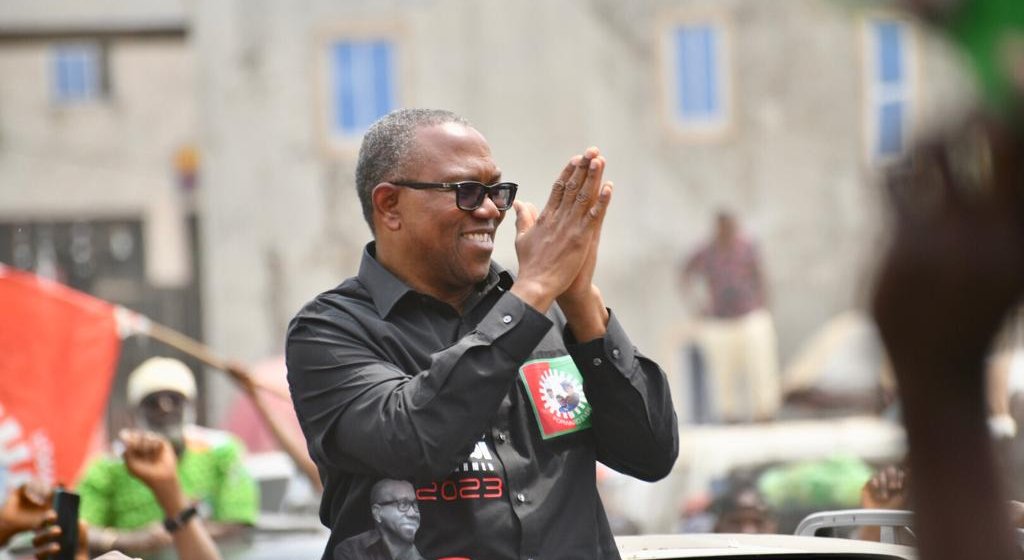|
LISTEN TO THIS THE AFRICANA VOICE ARTICLE NOW
Getting your Trinity Audio player ready...
|
In a first of a series, Africana Voices will take a look at the top three Nigerian canNigerians are going to the polls on February 25 in what has been described as the most important election in Africa and three candidates are considered the front runners likely to replace a termed-out President Muhammadu Buhari.
Peter Gregory Obi of the Labour Party (LP), has taken the campaign trail by storm, exciting his mostly youthful supporters known as Obidients, is viewed as the last hope for Nigeria. His Twitter page page has amassed 2.9 million followers to date, almost a million followers more than his main rival Bola Ahmed Tinubu, the presidential candidate for the ruling All Progressive Congress (APC), who has 1.6 million followers.
Obi, 62, has fashioned himself as a man of the people, who can identify with the problems affecting many poor Nigerians, thus quickly gaining a large following.
Through his campaigns, the business mogul and former governor of Anambra state, has come across as the antidote to the high unemployment rate in Nigeria, surging inflation, and general poverty bedeviling his country’s people.

Political analysts liken Obi to the incumbent president Muhammadu Buhari. During his campaign for the presidency in 2015, Buhari swept Nigeria’s streets, towns, and villages with promises that would rhetorically offer a utopian world. Similarly, through his populism campaign strategy, Obi has attracted many youths in Nigeria, called “Obidients” who argue that Obi is the only politician in Nigeria to hold office and come out with his reputation intact. Supporters point out that Obi left a surplus of $75 billion, a number his opponents have disputed.
However, besides his populism-oriented campaign, Obi and his running mate Datti Baba Ahmed, have also appealed to many Igbos, who the previous regimes have marginalized.
A brief peek into the political history of Obi shows a man who goes for what he wants, and he, more often than not, gets it.
In 2003, he contested for the gubernatorial seat of Anambra State in South-eastern Nigeria. He vied on the All Progressive Grand Alliance. Despite winning the vote, the Independent National Electoral Commission (INEC) declared Chris Ngige, his opponent, the winner. Obi challenged Ngige’s win in court, and after a three-year court battle, the court declared Obi the rightful seat winner. Consequently, he took the reins of power in March 2006.
However, his stay in power didn’t last long as he was impeached nine months later the same year over mismanagement of public funds and gross violation of the law. However, in 2017, while addressing the delegates of the Nigeria Symposium for Young and Emerging Leaders in Lagos, Obi cleared the air about the impeachment that happened. He said he was fired from the office for refusing to inflate the budget.
“I was impeached in Anambra State, removed from office twice, the first one is because of this budget issue,” the Premium Times publication in May 2017 quoted Obi.
“They want to repair the Office of the Governor, which is my office. The approved budget for 2006 was N298 million. I repaired everything with N43.2 million. They said I didn’t do it through due process because they have awarded the contract,” he said.
Luckily for him, the Court of Appeal nullified the impeachment after he challenged it in court, and he resumed office as governor in February 2007.
His woes were far from over yet, though. In 2007, after the general election, he was removed from office. Again, he sought the court’s intervention, arguing that his four-year term had not ended as he had only taken office a year ago. The Court of Appeal in Lagos granted him his prayers and ruled that he be let complete a full four-year term.
When the next gubernatorial election for Anambra State was held in 2010, he was re-elected. Nigerian analysts say that improvements in public funds’ education, healthcare, and financial discipline marked his terms at the helm of Anambra.
At the end of his second and last gubernatorial term, Obi decamped to the Peoples Democratic Party. He then said that he bolted from APGA not because of happenings in APGA “but because of the need to be a competitor and not a spectator in national affairs.”
In 2015, in the sunset days of his reign, the then-Nigerian President, Goodluck Jonathan, appointed Obi as the new chairman of Nigeria’s Securities and Exchange Commission (SEC).
In 2019, he was appointed the PDP vice presidential candidate in the presidential election. He was the running mate of Atiku Abubakar. The pair lost the election to the outgoing president Muhammadu Buhari and vice president Yemi Osinbajo.
In March 2022,
Obi declared that he would vie for the presidency of Nigeria under the Peoples Democratic Party. However, he stormed out of the party and said he would run under the Labour Party instead.
In his resignation letter dated May 24th, 2022, and addressed to PDP national chairman, Obi wrote:
“It has been a great honor to contribute to nation-building efforts through our party. Unfortunately, recent developments within our party make it impossible to continue participating and making such constructive contributions.
“Our national challenges are deep-seated and require that we each make profound sacrifices towards rescuing our country. My commitment to rescuing Nigeria remains firm, even if the route differs.”
Obi has several times in his campaign trail said he will get Nigerians out of poverty by diversifying production across the country. He repeated this message on Sunday, January 22nd, while addressing his supporters at Kano.
“We will pull people out of poverty by taking Nigeria from consumption to production and stop the sharing that has kept the country down,” Obi was quoted by the Punch publication.
He also said that his government would kill tribalism and division of Nigerians based on their religious affiliations.
“We will secure and unite Nigeria where people will be proud to say I am a Nigerian. We will kill the sentiments of tribe and religion, which they have been using to deceive us,” the alumnus of the University of Nigeria and Havard added.






























LEAVE A COMMENT
You must be logged in to post a comment.